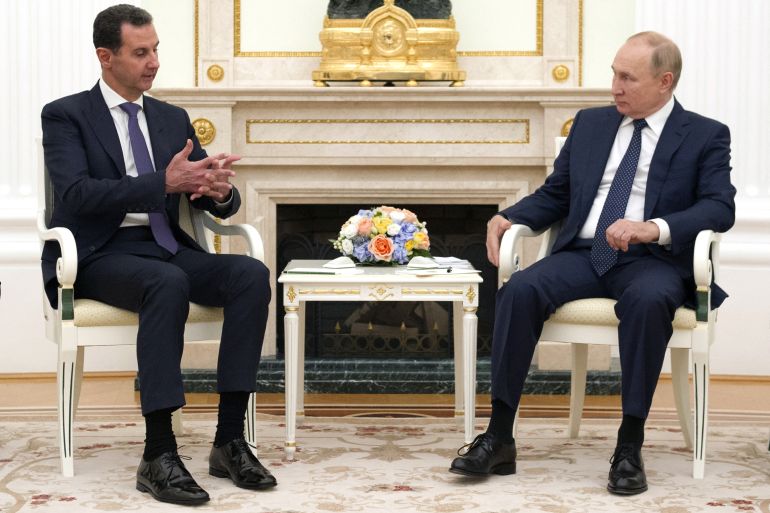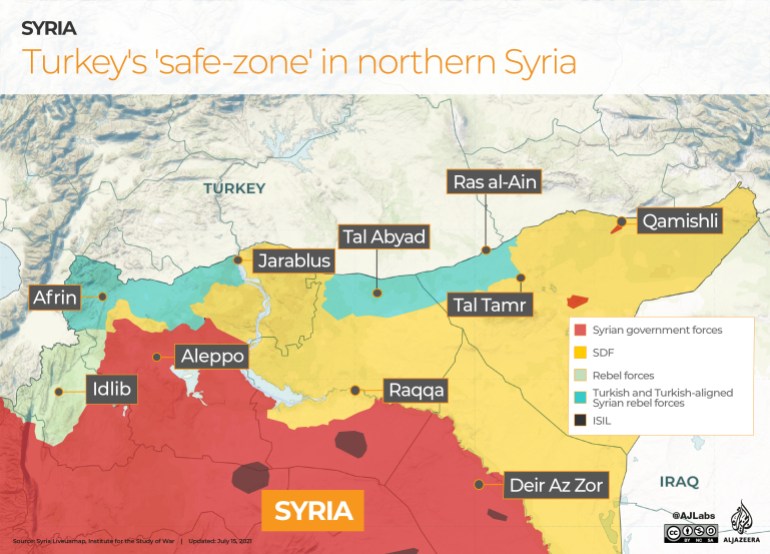Putin and Syria’s al-Assad hold talks in Moscow on rebel areas
Syria’s most powerful ally in the decade-long conflict, Russia’s Vladimir Putin denounced ‘foreign forces’ still fighting in the country.

Russia’s Vladimir Putin and Syria’s Bashar al-Assad have met in Moscow to discuss cooperation between their militaries and how to gain control of the last rebel-held areas in Syria.
The Monday night meeting between the two presidents was the first since they held a summit in the Syrian capital in January last year.
Keep reading
list of 4 itemsAttack on Turkish troops in Syria kills two soldiers
French jail term confirmed for uncle of Syria’s al-Assad
Several civilians killed in Syrian government attacks in Idlib
“The main problem, in my view, is that foreign armed forces remain in certain regions of the country without the approval of the United Nations and without your permission,” Putin told al-Assad, according to a Kremlin statement on Tuesday.
Syrian state TV described it as a long meeting and said the two were later joined by Syria’s Foreign Minister Faisal al-Meqdad and Russia’s Defence Minister Sergei Shoigu to discuss mutual relations and “fighting terrorism”.
Al-Assad’s most powerful ally in the decade-long Syrian conflict, Putin last received the Syrian leader in Russia in 2018 at his summer residence in the Black Sea resort of Sochi.
Russia’s air force played a critical role in turning the tide of the Syrian war in al-Assad’s favour after it deployed there in 2015, helping him recover most territory lost to armed groups.
However, significant parts of Syria remain out of state control, with Turkish forces deployed in much of the north and northwest – the last major bastion of anti-al-Assad rebels – and American forces in the Kurdish-controlled east and northeast.
‘Control 90 percent of the territory’
Al-Assad, who has also been backed by Iran during the conflict, has made few trips abroad since the war began in 2011.
“I am happy to meet you in Moscow, six years after our joint operations to fight terrorism,” Syrian TV quoted al-Assad as saying.
Putin told al-Assad foreign forces in Syria without a UN decision were a hindrance to its consolidation, the Kremlin statement said.
Putin also congratulated him on winning a fourth term in office in a presidential election in May.
“Terrorists sustained very serious damage and the Syrian government, headed by you, controls 90 percent of the territories,” Putin said, according to the Kremlin.
The Kremlin said al-Assad thanked the Russian leader for humanitarian aid to Syria and for his efforts to halt the “spread of terrorism”.
He lauded what he called the success of Russian and Syrian armies in “liberating occupied territories” of Syria.
‘Completing the liberation’
Al-Assad also described sanctions imposed by some nations on Syria as “anti-human” and “illegitimate”.
The United States tightened sanctions against Syria last year, saying they were aimed at forcing al-Assad to stop the war and agree to a political solution.
Syrian state news agency SANA said the two leaders discussed cooperation between the Syrian and Russian armies in “combating terrorism and completing the liberation of the land that is still under the control of terrorist organisations”.
In recent weeks, Syrian opposition activists said Russian warplanes carried out air attacks on the northwestern province of Idlib, the last major rebel stronghold in the country. The region is home to about four million people, many internally displaced by the conflict.
Last week, a Russian-negotiated ceasefire deal went into effect to end a government siege and intense fighting in the southern city of Deraa. The deal brought areas held by the rebels in the city under government control for the first time since 2013.
Russia’s political and military support for Syria, where it maintains army bases, has been a particular sticking point in Moscow’s relations with the West, which has imposed sanctions on Moscow for bolstering the al-Assad government.
Syria’s conflict began in March 2011 with anti-government protests and later turned into a civil war that has killed hundreds of thousands of people and displaced half the country’s prewar population of 23 million, including five million refugees outside the country.